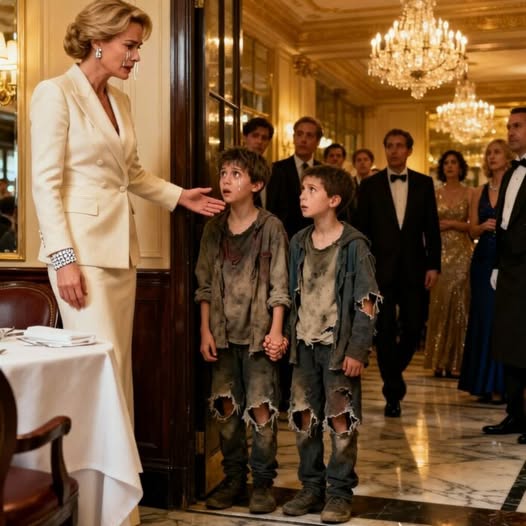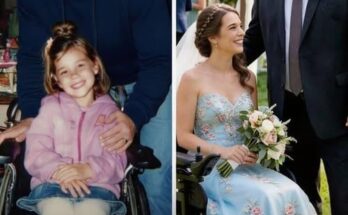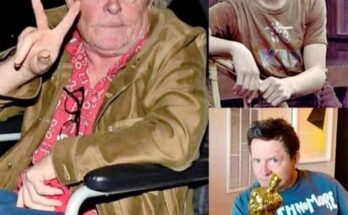
The whisper rippled through the chandelier-lit hush. Heads swiveled. Two thin boys—one long-limbed, maybe twelve; the other small enough to tuck behind his brother—stood in torn shirts and city dust. Their feet were bare against the polished marble.
At the center table, Lila Carver—Manhattan developer, the kind of success that made headlines—set down her crystal glass. Diamonds glinted at her wrist as the room held its breath, all polite unease and averted eyes.
But Lila wasn’t looking at anyone else.
She was staring at the taller boy’s face—at the slope of his nose, the steel-blue eyes, the crescent scar by his eyebrow.
Her world tilted.
“…Noah?” she breathed.
The boy’s brow knit. “How do you know my name?”
The sound of it cracked something open inside her. Noah Carver—her only child, gone nearly seven years after a wreck that put her in a coma and left everything she loved scattered—stood trembling in front of her asking for scraps.
The restaurant murmured. A waiter stepped forward, uncertain. Lila lifted a hand. “Please. Don’t touch them.”
She pushed her chair back and rose, moving slowly, like the floor might disappear. “It’s me,” she said, voice unsteady. “I’m your mother.”
The smaller boy tugged at Noah’s sleeve. “Let’s go, Noah. She’s just rich.”
But Lila kept coming, eyes brimming. “No, baby. I never stopped looking. I thought I’d lost you.”
Noah’s jaw hardened. “My mom died in the crash. That’s what they told me.”
The words hit like a fist. Her fingers shook as she opened her wallet and slid out a sun-faded photo: a laughing little boy waist-deep in ocean foam.
“I’ve carried this every day,” she whispered.
Noah reached for it, hand trembling. The quiet stretched and stretched—fear and disbelief wrestling with a small, stubborn hope.
Finally he said, almost too soft to hear, “We’ve been behind the train yard. Me and my friend Mateo. The home… wasn’t safe. We left.”
The chandeliers, the hush, the etched silver—none of it mattered anymore.
Lila knelt in front of him, tears spilling freely. “Then come home.”
Noah looked to Mateo, uncertain. His stomach growled; the kitchen’s warm smells were a tide. He nodded once. Lila’s hand—trembling—found his.
For the first time in seven years, she touched her son. The world stilled.
The drive to Lila’s penthouse passed in quiet engine hum and streetlight flicker. Mateo cupped a sandwich the driver handed him, nibbling like it might vanish. Noah watched the city streak past, cheekbones sharp in the window’s reflection.
At the door, both boys paused. Marble, a grand staircase, light pooled across rugs too soft to trust.
“You can stay tonight,” Lila said gently. “You’re safe here.”
Noah followed her into the kitchen, wary as she filled a pot and set it to simmer. She hadn’t cooked in years. Mateo slid onto a chair, eyes flicking between them.
Lila watched Noah eat, soaking in the small details she’d missed—white lines across his knuckles, the hollows in his face, the careful way he chewed.
After, she set out clean shirts and thick blankets. “Guest room’s made up. Tomorrow we’ll… talk.”
She didn’t sleep. She stood in the dim hall, watching through the cracked door as Noah tossed, one arm curved protectively around Mateo even in dreams.
Morning brought the question she feared. “Why didn’t you find me?”
Her throat closed. “I tried, Noah. They told me… there were no survivors in your seat. I didn’t believe it. I searched shelters, hospitals—every trail went cold.”
He stared, jaw tight. “We waited. For years.”
Guilt pressed like stone. “I can’t undo it,” she said. “But I can give you what you deserve now—a home.”
Days softened. Noah ate real meals. Mateo warmed to the housekeeper, who fussed like a favorite aunt. Laughter returned in small pockets, skittish at first, then braver.
Then paparazzi found them.
A knot of cameras bloomed outside the lobby one evening. Flashbulbs popped. Panic flared in Noah’s eyes; he grabbed Mateo’s hand and bolted for the elevator. Lila cut them off at the foyer.
“Wait!” she cried. “They won’t hurt you.”
He turned, breathing ragged. “We don’t belong here.”
“You do,” Lila said, voice breaking. “You’re my son. You belong with me.”
He hovered at the edge—then collapsed into her arms, sobbing.
The walls money built fell away, replaced by arms that knew exactly how to hold him.
Months later, the city loved its headline: The Millionaire Who Found Her Lost Son Among the Homeless. Lila didn’t care about the buzz anymore. She had Noah—and the quiet, loyal boy who’d come to feel like a second child.
Therapy and school began. It wasn’t simple—nightmares lingered, trust grew in inches—but each day rewrote a little of the story. Lila started paperwork to adopt Mateo; he stopped flinching at doorbells.
For illustration only
One evening in Central Park, Noah said, “When we slept outside, we watched fireflies. They made the dark easier.”
Lila brushed his hair back. “Then let’s make a place where other kids can find their light.”
The Firefly House opened that spring: a shelter and recovery program for runaway and homeless youth. On opening day, Noah stood beside his mother in a neat navy jacket and told a small crowd:
“Sometimes you lose everything just to find what matters. I thought I lost my family. Really, I lost hope. My mom gave it back.”
Applause swelled. Lila wept openly. For all her towers of glass and steel, this was the finest thing she’d ever build.
That night, tucking Noah and Mateo in, she whispered, “You saved me too.”
Outside, the city glimmered like a jar of fireflies—tiny steady lights of second chances and love found again.
And for the first time in years, Lila Carver felt whole.


